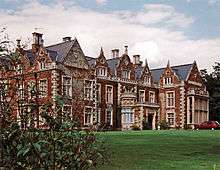Sir Gilbert Dolben, 1st Baronet
Sir Gilbert Dolben, 1st Baronet (1658-1722) was an English lawyer landowner and politician who also served as a judge in Ireland for many years, while continuing to sit in the House of Commons of England.[1] He was the grandfather of the noted anti-slavery campaigner Sir William Dolben.
Family
He was the elder son of John Dolben, Archbishop of York, and Catherine Sheldon. His background was strongly episcopal: he was a grand-nephew of Gilbert Sheldon, Archbishop of Canterbury and a more remote connection of John Williams, Archbishop of York. His uncle Sir William Dolben was a distinguished judge.[2]
Samuel Pepys, who saw him as a child, described him as a very pretty boy, and very like his father in appearance. He went to Westminster School and Christ Church, Oxford, but did not take a degree. He entered the Inner Temple and was called to the Bar in 1680.[3]
Politician
He first entered Parliament as MP for Ripon in 1685 and remained in the Commons with short intervals until 1714, sitting in turn for Ripon, Peterborough and Yarmouth, Isle of Wight.[2]
Although he was a Tory in politics, he supported the Glorious Revolution, and argued with great force that James II could be deemed to have abdicated.[2] He opposed the attainder of Sir John Fenwick for treason in 1696, not because he thought him innocent but because he thought the case should be dealt with by ordinary process of criminal law. In the debates following the judgment in Ashby v White, he argued strongly that the House of Commons had exclusive jurisdiction over all disputed elections.[2]
Judge
In 1701 he became a judge of the Court of Common Pleas (Ireland) and he joined the joined the King's Inn, the professional body which governed the Irish Bar[3] He remained a member of the English House of Commons, and divided his time between England and Ireland, somewhat to the neglect of his judicial duties.[4] Though he was said to be on bad terms with Thomas Wharton, 1st Marquess of Wharton, the Lord Lieutenant of Ireland from 1708, his time in Ireland seems to have been uneventful. He was one of the few High Court judges who refused to become involved in the bitter feud between the Crown and Dublin Corporation in 1713-4; whether for this reason, or because of his wealth and social standing (he had married an heiress and was made a baronet in 1704) he was the only senior Irish judge who was not removed from office in the general purge which followed the death of Queen Anne.[3] He did solicit for a seat on the English Bench but did not receive it and remained on the Irish Bench until he retired in 1720. He was a bencher of his Temple and Treasurer in 1721. He is said to have been one of the relatively few investors who enriched themselves, rather than suffering financial loss, in the South Sea Bubble.[2]
Family and personality
He married Anne, eldest daughter and co-heiress of Tanfield Mulso of Finedon Hall, Northamptonshire, (a marriage which greatly increased his wealth) and had one surviving son, Sir John Dolben, 2nd Baronet, who was father of Sir William Dolben, 3rd Baronet, a leader in the movement for the abolition of slavery. He died at Finedon in October 1722.[2]

He was a man of scholarly tastes: John Dryden acknowledged the help Dolben had given him in preparing his translations of Virgil.[2]